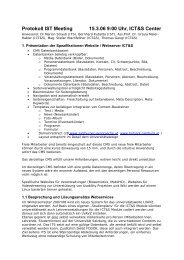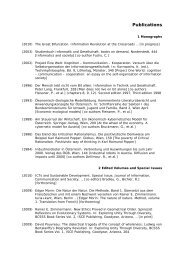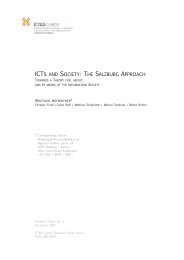CHRISTIAN FUCHS - ICT&S - Universität Salzburg
CHRISTIAN FUCHS - ICT&S - Universität Salzburg
CHRISTIAN FUCHS - ICT&S - Universität Salzburg
You also want an ePaper? Increase the reach of your titles
YUMPU automatically turns print PDFs into web optimized ePapers that Google loves.
Christian Fuchs: Social Networking Sites and the Surveillance SocietystudiVZ information behaviour index. In total, 49.2% have opted out of all threeadvertising options and 20.5% have opted out of two advertising options. 7.8% haveopted out from only one advertising option and 22.6% have not opted out of anyadvertising option. After the new terms of use came into effect, the standard advertisingsettings for all old and new users were that advertising clients of studiVZ are allowed tosend ads to users per email and the studiVZ message service, that personalizedadvertising is enabled, and that studiVZ can send announcements to users.These results show that students in <strong>Salzburg</strong> who use studiVZ tend to have goodknowledge of what studiVZ is allowed to do with their data and tend to have takensteps for guaranteeing that advertising and personalized advertising are minimized.Bivariate correlations show that the knowledge users have about what studiVZ isallowed to do with their personal data is positively correlated with the surveillancecritique index at a significance level of 0.01. Bivariate correlations also show that userstend to deactivate the possibilities that studiVZ has for sending them advertisings orpersonalized advertisings, if they tend to read terms of use in general and if they arecritical of surveillance. Although students tend to rather not read terms of use andprivacy policies of social networking sites in general, in the case of the new terms ofuse of studiVZ that were introduced at the beginning of 2008, 46.6% of the studiVZusers said that they had read the terms in detail before agreeing and 38.7% say thattheir trust in studiVZ decreased after the new terms had come into effect.Information about the changes in privacy, surveillance, and advertising that studiVZplanned by introducing new terms of use, seems to have activated the critical potentialof the students that is present in the form of a general critical attitude towardssurveillance so that a majority of students have actively taken steps to limit the amountand type of advertising they receive.The change of the terms of use was also reported by the mass media. A comparison ofnewspaper and magazine articles on the issue shows that most of them straightforwardannounced that the change of the terms of use means more surveillance and lessprivacy in order to maximize economic profits of the Holtzbrinck corporation. Thiscoverage seems to have positively influenced students’ knowledge about studiVZ andthe resulting information behaviour. But besides news coverage on the new studiVZterms of use, there was also an online campaign. This campaign was mainly aninformation campaign and not a manifestation of electronic civil disobedience. Oursurvey data indicate that the online information campaign succeeded in drawingattention to the issue of surveillance by studiVZ and let a vast majority of users todisable advertising options. Nonetheless personalized advertising and advertisingmessages per email and message service have been introduced and are now standardsettings on studiVZ. The studiVZ information campaign did not attract a very largenumber of active users and seems not to have reached a co-operative level of protest,but it seems to have succeeded in bringing many users to deactivate advertisingoptions. But of course advertising and targeted advertising continue to exist on studiVZ,which means that the platforms sells its users as an audience commodity to advertisingclients in order to accumulate money capital.Overall, media information and an online information campaign seem to be some ofthe causes of the high degree of knowledge and the high degree of critical information112









